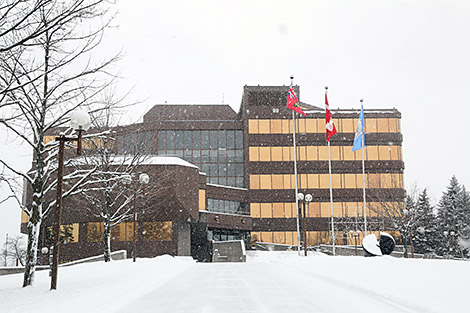 NEWS RELEASE
NEWS RELEASE
SAULT STE MARIE
CHAMBER OF COMMERCE
*************************
In less than four weeks, Sault Ste. Marie will host delegates from Chambers of Commerce and Boards of Trade from across the province as the Ontario Chamber of Commerce (OCC) Annual General Meeting & Convention takes place May 1 to 4 at the local Comfort Suites & Conference Centre.
The Ontario Chamber of Commerce Annual General Meeting & Convention is the agency’s key policy development event of the year.
It provides a forum for member delegates to debate policy resolutions that will formulate the OCC’s annual advocacy strategies.
It is anticipated that the Convention will draw between 150 and 200 participants to Sault Ste. Marie.
In preparation for the annual AGM & Convention, Chambers and Boards from across the province prepare policy resolution submissions.
The Ontario Chamber reviews the policy resolutions in advance of the AGM to determine whether or not they support the proposed resolutions, in full or in part, prior to the resolutions being put forth for debate at the AGM.
The Sault Ste. Marie Chamber of Commerce (SSMCOC) has submitted three policy resolutions to the Ontario Chamber Policy Review committee and all three were approved to be included in the policy debate at the upcoming Convention.
The first policy resolution submitted by the Sault Chamber proposes enhancing the Ontario Municipal Partnership Fund (OMPF).
The OMPF is a program that, in part, costs the province $550 million dollars in direct unconditional transfer payments from the province to municipalities that can’t fund their own budgeted expenses.
The program is essentially a transfer from “have” cities to “have‐not” cities, of which Sault Ste. Marie is a “have‐not” city.
The resolution seeks to create a program that will provide incentives to municipalities in receipt of OMPF funding to control spending, taxation and grow their tax base.
Sault Ste. Marie currently receives $17,240,000 of OMPF funding from the province.
This means that more than 17% of the local budget is paid for by the province.
The resolution also calls on changes to the OMPF structure to allow the province to use OMPF funding to finance economic growth in the municipalities that receive OMPF funds.
The aim of the resolution is to use the OMPF budget to target improved municipal management and increased economic activity in the municipalities that receive OMPF funding so that more cities will become self‐sufficient.
According to Mark Barsanti, current president of the Sault Ste. Marie Chamber of Commerce: “The OMPF includes an unconditional grant payment to municipalities which are unable to fund their service commitments. The unconditional funding is paid on a need basis and the program does not include any incentives for municipalities to operate more efficiently, improve their local economies or to reduce municipal reliance on the OMPF grant; in its current state, The OMPF grant supports the existence of a ‘have’ and ‘have‐not’ set of municipalities and impairs the ability of the Ontario government to invest in the future of the province as a whole.”
The second resolution, submitted in partnership with the Hamilton Chamber of Commerce, deals with fair municipal tendering.
According to the resolution, current provisions under the Ontario Labour Relations Act severely restrict the ability of some municipalities and some school boards to provide open tendering for major infrastructure projects; this legislative regime is perceived as unfair.
In cities that are caught by the provisions of the Act, the only contractors that can bid on publically funded construction projects paid for by the local government are those whose employees chose to sign with one of two unions.
Even if the employees are members of another union, the company cannot bid.
Often this bars otherwise qualified companies from bidding and results in out of town companies winning contracts at the local level.
It also results in fewer bids being received for such projects.
The City of Sault Ste. Marie has been opposed to this practice for more than 20 years.
The resolution would call on the Provincial Government to pass legislation that clearly exempts all municipalities and school boards from the restrictive provisions of the Act that bring about this unfairness.
The third resolution submitted by the Sault Chamber, calls for standardization of electronic financial reporting for municipalities.
Barsanti notes that “Chambers of Commerce and Boards of Trade advocate on behalf of their members for, among other things, effective and efficient government.
At the local level, Chambers and Boards need to be able to make meaningful comment and constructive recommendations to local government, and to do that they require access to clear, consistent information that can be used to easily compare and contrast municipalities across the province.
The format and the metrics used to report financial information however are not consistent across all municipalities.
This reality makes it very difficult, and in some cases impossible, for Chambers, Boards of Trade, and taxpayers in general, to properly compare the efficiency and effectiveness of one municipality to another.“
If adopted at the 2014 OCC AGM & Convention, these policies will add to the framework of advocacy and lobbying efforts undertaken by the OCC on behalf of Ontario’s business community.
The preliminary listing of OCC policy resolutions (subject to change) to be discussed at the upcoming AGM & Convention can be found at: http://www.occ.ca/wp‐content/
*************************